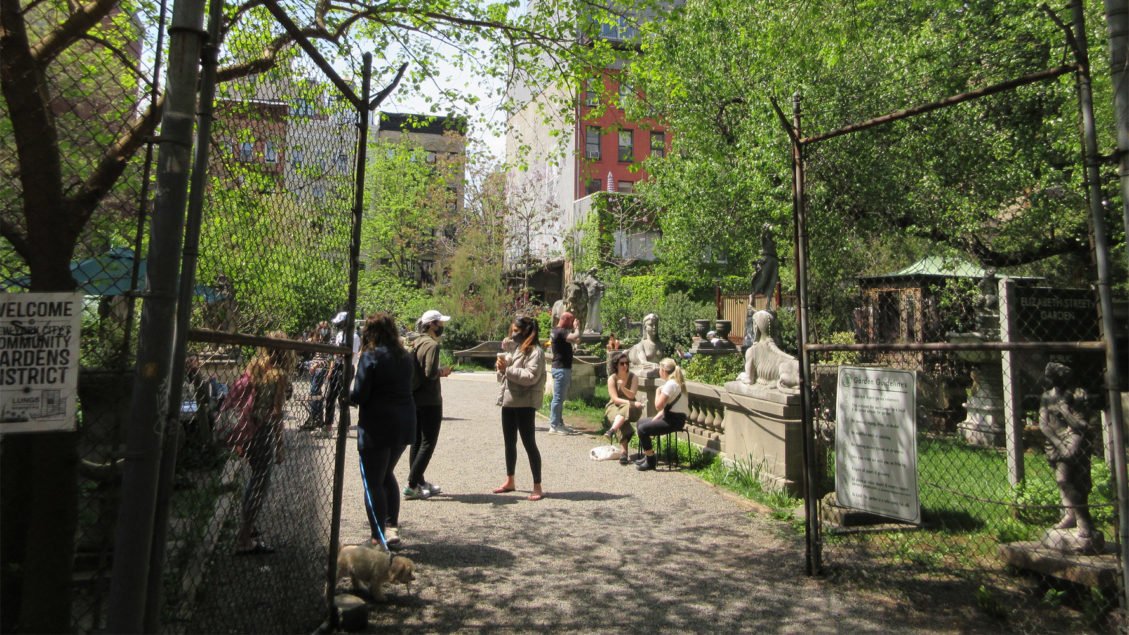Elizabeth Street Garden Gets Temporary Stay of Eviction

The Elizabeth Street Garden remains planted in place—at least for a couple more weeks.
On October 16, the one-acre plot of privately-operated green space in New York’s Nolita neighborhood received a last-minute legal reprieve after seemingly losing its decade-long battle with the city this summer. It was ordered to vacate the property on September 10, but the embattled garden got another two weeks of life when an appeals court judge waived the eviction notice. It can now remain open until at least October 30.
The legal maneuver is the latest twist in conflict that began in 2013, when the Department of Housing Preservation and Development (HPD) proposed building affordable housing on the city-owned lot. It had been leased month-to-month by gallery owner and real estate developer Allan Reiver since the early 1990s.
In 2019, Elizabeth Street Garden Inc. (ESG), the nonprofit that serves as steward of the L-shaped space, which had filed a lawsuit arguing that the city hadn’t performed proper environmental review on the site. But in May 2024, New York’s Court of Appeals ruled against ESG. The court found that the city had complied with all necessary procedures, including the Uniform Land Use Review Procedure and the City Environmental Quality Review process, in its plans to develop the site.
The proposed housing development, Haven Green, aims to provide 123 units of “deeply affordable” housing for low-income seniors, with 37 units dedicated to the formerly homeless. Developed by Pennrose Properties, Habitat for Humanity New York City, and RiseBoro Community Partnership, the plan also includes preserving 16,000 of the lot’s 20,000 square feet as a publicly accessible garden.
Despite these concessions, ESG has waged a vigorous campaign to save the garden. Over the years, the organization has collected more than 450,000 signatures, courted political allies from city council and the state senate, and garnered support from notable New Yorkers including Patti Smith, Robert De Niro, and Martin Scorsese.
And as legal battles intensified this summer, so did the imperiled garden’s efforts. In a high-profile event during New York Fashion Week, the space hosted a star-studded fashion show for the brand Libertine, featuring models wielding pails and shovels marching down the garden’s paths to Joni Mitchel’s anti-development anthem “Big Yellow Taxi.”
ESG has appealed to neighbors and New Yorkers by preaching a narrative of a grassroots community space with a 200-year history. It’s a story that’s not entirely accurate.
The site’s modern incarnation began in 1991, when Reiver brokered an agreement with the city to rent a vacant lot across the street from his apartment for $4,000 a month. He transformed the trash-strewn wasteland, filling it with greenery and antique statuary salvaged from estate sales. However, the garden was padlocked—only accessible through Reiver’s small antiques shop next door—until Haven Green was first proposed.
“The only thing to do was to open it to the public,” he said in a 2019 interview with New York real estate blog 6sqft. “Let the public defend it. Let the public fall in love with it.”
Neighborhood residents and businesses formed the Friends of Elizabeth Street Garden in 2012, which splintered and formed ESG in 2016, which now programs and maintains the space year-round as a full-fledged community garden. Allan Reiver died in 2021. The nonprofit is currently run by his son, Joseph.
Elizabeth Street Garden has become a more accessible public space in recent years. And the legal wrangling over its fate is a saga that has divided the community and raised questions about the city’s urban development priorities.
ESG has proposed alternative sites for the development, arguing that up to 705 new affordable housing units could be realized elsewhere while preserving the garden. Critics, however, point out that this proposal relies on complex funding transfers and upzoning that may be challenging to implement.
“The well-heeled Elizabeth Street Garden has dug in its heels for nearly a decade to prevent the city from building affordable housing for low-income and formerly homeless seniors,” a City Hall spokesperson told the New York Post regarding the most recent court ruling. “We are not surprised or deterred—we’re working to immediately resolve this last-minute attempt to prevent the city from building the affordable housing and public green space this neighborhood deserves.”
As the new October 30 eviction deadline approaches, the fate of Elizabeth Street Garden remains uncertain. While the recent stay offers a glimmer of hope for supporters, it is likely to be a temporary delay to an inevitable outcome.


